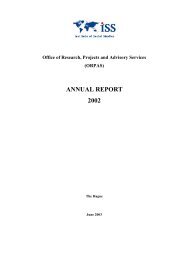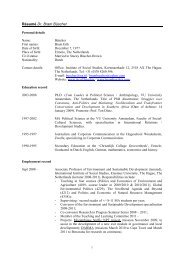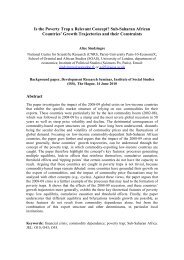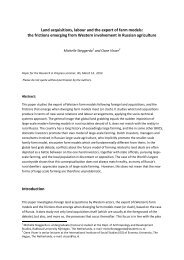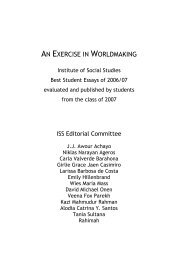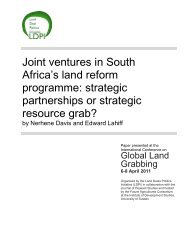AN EXERCISE IN WORLDMAKING 2009 - ISS
AN EXERCISE IN WORLDMAKING 2009 - ISS
AN EXERCISE IN WORLDMAKING 2009 - ISS
You also want an ePaper? Increase the reach of your titles
YUMPU automatically turns print PDFs into web optimized ePapers that Google loves.
6 The Utility of the Citizen: Relating Citizenship in Social Movement Activity 63<br />
project dedicated to these concerns where citizenship confers a sense of<br />
responsibility and the recognition of rights to these three arenas.<br />
CONTEST<strong>IN</strong>G DEF<strong>IN</strong>ITIONS<br />
In a simplistic sense, a citizen is “a member of a political community<br />
who is endowed with a set of rights and a set of obligations” (Shukla<br />
2006: 94). Therefore, citizenship is commonly viewed to represent the<br />
relationship between the individual citizen and the state whereby the two<br />
are entwined with reciprocal rights and obligations (ibid). Turner (1993)<br />
broadens this reciprocity whereby in recognizing citizenship, this shapes<br />
the flow of resources to persons and social groups (2). T.H. Marshall is<br />
widely acknowledged as a forefather in citizenship studies, with his distinction<br />
of political, civil and social citizenship identifying distinct rights<br />
and institutions in modern societies existing to service these rights. In a<br />
general sense, Marshall’s analysis of citizenship understands social rights<br />
as contextualized and connected with history and the subsequent operation<br />
of civil and political rights. By degree, most mainstream approaches<br />
address citizenship “as a complex and contextualized status giving expression<br />
to ideals of personal autonomy, social justice, equity and inclusiveness<br />
in modern societies” which Marshall identities as “democraticwelfare-capitalist”<br />
formations (Roche 2002: 72). These formations are<br />
serving and giving substance to autonomy that is presumably expressed<br />
through political and civil rights. Marshall’s analysis accounts for complexities<br />
and context however, must be expanded to account for additional<br />
contexts and social formations beyond the level of the nation state<br />
that in many ways can repress autonomy. Such formations will be discussed<br />
further in relation to the conflicting dynamics of capitalism and<br />
capitalist societies.<br />
Over the past few decades, various challenges have emerged to historical<br />
and more mainstream theories of citizenship. The typologies and<br />
methods through which citizenship is commonly understood have been<br />
expanded to consider it “not as a legal status but as a form of identification,<br />
a type of political identity: something to be constructed, not empirically<br />
given” (Mouffe 1992: 231). Recognizing the impacts of globalization<br />
and in particular the global capitalist economy furthers the analysis<br />
of understanding these structures in relation to the realization of citizenship.<br />
These complexities leave the nation-state and national level considerations<br />
of citizenship alone as inadequate, as there are forces outside of




